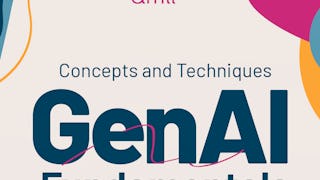This comprehensive Generative AI Training, Evaluation, and Trends course equips you with the skills to build, optimize, and future-proof GenAI systems. Begin by learning how generative models are trained and evaluated using real-world metrics. Explore Retrieval Augmented Generation (RAG) to improve model accuracy by combining external data with LLMs. Progress into key trends shaping GenAI—like scalable architectures, real-time applications, and model transparency—while examining how these advancements apply across industries like healthcare, finance, and education.
Unlock access to 10,000+ courses with Coursera Plus. Start 7-Day free trial.


您将学到什么
Train and evaluate generative AI models using real-world techniques
Apply Retrieval Augmented Generation (RAG) to improve output accuracy
Understand emerging trends in GenAI architecture and deployment
Translate GenAI advancements into practical, industry-ready solutions
您将获得的技能
要了解的详细信息

添加到您的领英档案
6 项作业
了解顶级公司的员工如何掌握热门技能

积累特定领域的专业知识
- 向行业专家学习新概念
- 获得对主题或工具的基础理解
- 通过实践项目培养工作相关技能
- 获得可共享的职业证书

该课程共有2个模块
Build a strong foundation in Generative AI with this module covering its importance, real-world impact, and core concepts. Understand why GenAI matters through relatable analogies and explore key model types, including Variational Autoencoders (VAEs), Generative Adversarial Networks (GANs), and Transformer-based models. Ideal for beginners starting their GenAI journey.
涵盖的内容
8个视频1篇阅读材料3个作业
Explore how Generative AI models are trained, evaluated, and enhanced using Retrieval Augmented Generation (RAG). Learn the key steps in model training, techniques to assess model quality, and understand how RAG improves output accuracy by combining retrieval and generation. Discover emerging trends shaping the future of GenAI and gain insights into evolving industry applications.
涵盖的内容
6个视频3个作业
获得职业证书
将此证书添加到您的 LinkedIn 个人资料、简历或履历中。在社交媒体和绩效考核中分享。
位教师

提供方
从 Machine Learning 浏览更多内容
 状态:免费试用
状态:免费试用 状态:免费试用
状态:免费试用Edureka

Alberta Machine Intelligence Institute
 状态:免费试用
状态:免费试用Starweaver
人们为什么选择 Coursera 来帮助自己实现职业发展




常见问题
Generative AI models are algorithms that create new content such as text, images, or code; based on patterns learned from data. Common types include GANs, VAEs, and transformer-based models like GPT.
Foundation models are large-scale AI models trained on vast, diverse datasets and adaptable across a wide range of tasks. Examples include GPT, BERT, and CLIP.
The four models of AI are reactive machines, limited memory, theory of mind, and self-aware AI; representing increasing levels of complexity and cognitive capabilities.
更多问题
提供助学金,



